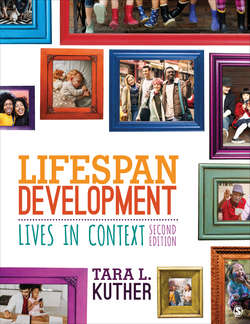Читать книгу Lifespan Development - Tara L. Kuther - Страница 376
На сайте Литреса книга снята с продажи.
Autobiographical Memory
ОглавлениеAutobiographical memory refers to memory of personally meaningful events that took place at a specific time and place in one’s past (Bauer, 2015). Autobiographical memory emerges as children become proficient in language and executive function and develops steadily from 3 to 6 years of age (Nieto, Ros, Ricarte, & Latorre, 2018). Young children report fewer memories for specific events than do older children and adults (Baker-Ward, Gordon, Ornstein, Larus, & Clubb, 1993). But by age 3, they are able to retrieve and report specific memories, especially those that have personal significance, are repeated, or are highly stressful (Nuttall, Valentino, Comas, McNeill, & Stey, 2014). For example, in one study, children who were at least 26 months old at the time of an accidental injury and visit to the emergency room accurately recalled the details of these experiences even after a 2-year delay (Goodman, Rudy, Bottoms, & Aman, 1990). Eight-year-old children have been found to accurately remember events that occurred when they were as young as 3½ years of age (Goodman & Aman, 1990).
Events that are unique or new, such as a trip to the circus, are better recalled; 3-year-old children will recall them for a year or longer (Fivush, Hudson, & Nelson, 1983). Frequent events, however, tend to blur together. Young children are better at remembering things they did than things they simply watched. For example, one study examined 5-year-old children‘s recall of an event they observed, were told about, or experienced. A few days later, the children who actually experienced the event were more likely to recall details in a more accurate and organized way and to require fewer prompts (Murachver, Pipe, Gordon, Owens, & Fivush, 1996).
The way adults talk with the child about a shared experience can influence how well the child will remember it (Haden & Fivush, 1996). Parents with an elaborative conversational style discuss new aspects of an experience, provide more information to guide a child through a mutually rewarding conversation, and affirm the child’s responses. They may ask questions, expand children’s responses, and help the child tell their story. Three-year-olds of parents who use an elaborative style engage in longer conversations about events, remember more details, and tend to remember the events better at ages 5 and 6 (Fivush, 2011).
